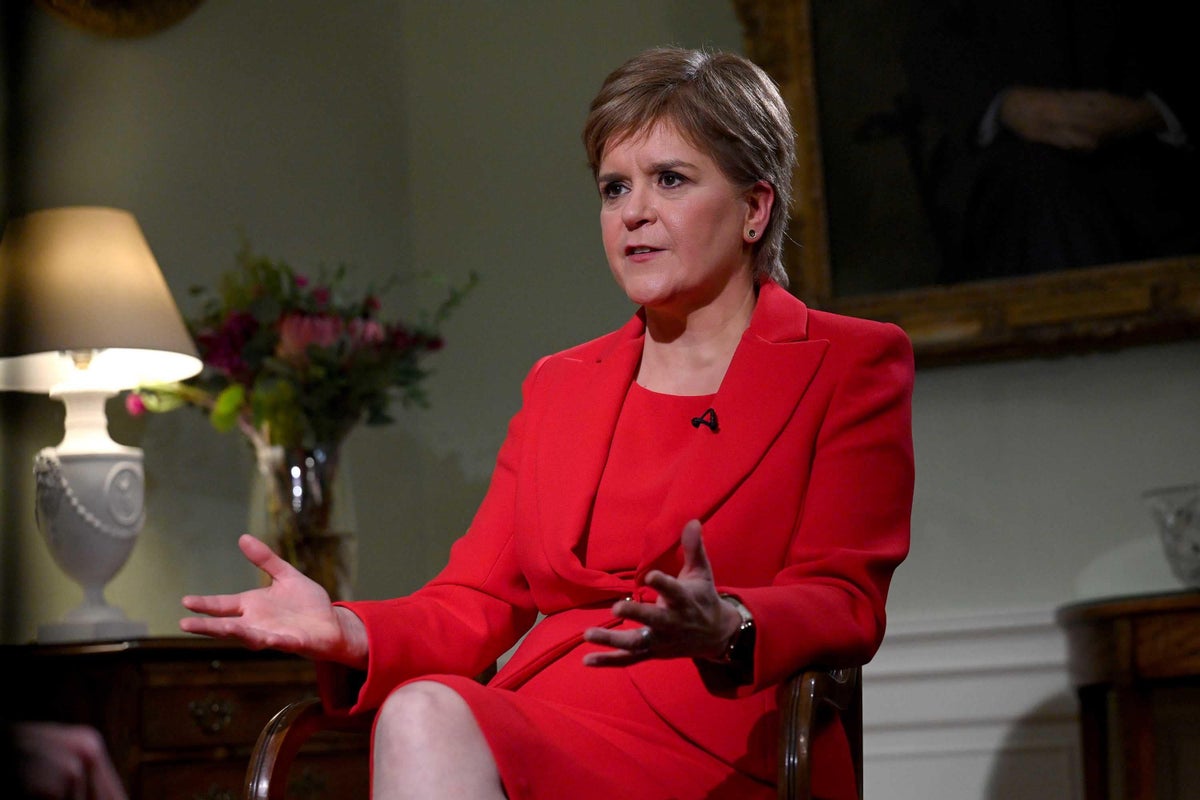
Some opponents of gender recognition reform are using women’s rights as a “cloak of acceptability” for transphobia, Nicola Sturgeon has claimed.
But the First Minister stressed not all opponents of her Government’s Gender Recognition Reform Bill hold this view.
The UK Government has blocked the Bill from becoming law, citing its impact on UK-wide equalities legislation, triggering a constitutional dispute which is likely to go to court.
In an interview with Global’s The News Agents podcast, Ms Sturgeon said: “I have heard people, politicians, claiming to be defenders of women’s rights who I’d never heard defend women’s rights in the past.
“In fact, I’ve heard some support policies… that run counter to women’s rights.
“We have legislation looming later in this Parliament on criminal justice reform to try to deal with issues of low conviction rates for rape and sexual assault, we are likely to be dealing with legislation in months to come around abortion buffer zones.
“I think it will be interesting to see how many of the so-called defenders of women’s rights in the context of the trans debate suddenly don’t think that all women’s rights are actually important.
“There are some people that I think have decided to use women’s rights as a sort of cloak of acceptability to cover up what is transphobia.
Instead of engaging with the criticism and admitting she was wrong, Nicola Sturgeon would rather launch baseless smear attacks at those who disagree with her— Rachael Hamilton, Scottish Conservatives
“Now, again, that’s not everybody who opposes this Bill. I want to be very clear about that.
“But there are people who have opposed this Bill that cloak themselves in women’s rights to make it acceptable, but just as they’re transphobic you’ll also find that they’re deeply misogynist, often homophobic, possibly some of them racist as well.”
The First Minister went on to say she supports – “as a general principle” – those who rape women being barred from women’s prisons.
Rachael Hamilton, the Scottish Conservative equalities spokeswoman and one of the most vociferous opponents of the Bill, described the First Minister’s comments about those against the legislation as “disgusting and desperate”.
She said: “The last few days have shown that Nicola Sturgeon’s gender ID reforms are legally questionable, deeply unpopular and potentially harmful to women.
“Yet, instead of engaging with the criticism and admitting she was wrong, Nicola Sturgeon would rather launch baseless smear attacks at those who disagree with her.”
The First Minister also said she is no longer certain UK Government would not abolish the Scottish Parliament, given the use of the Section 35 order that blocked the gender reforms.
“I’ve had people on my own side of the independence argument over the years say ‘the Tories are capable of abolishing the Scottish Parliament or completely taking away significant powers’,” she said.
“I’ve always resisted that, that’s hyperbole, let’s not go down that road.
“Now, I still don’t think it is likely they would try to abolish the Scottish Parliament – am I 100% sure of that anymore? No.
“But short of that, I do think there is a concerted effort to undermine, de-legitimise and remove powers from this Parliament.”
She added that she “absolutely” thinks some within the Conservative Party would like to abolish Holyrood.
Elsewhere in the interview, Ms Sturgeon said there should be “reflection” on the appointment of BBC chairman Richard Sharp.
Mr Sharp’s appointment is currently being reviewed amid revelations around his role in helping Boris Johnson secure a loan.
Asked whether Mr Sharp should resign, the SNP leader said: “I think there are probably people above him in the queue of folks in public office who should resign at the moment and a former chancellor being one of them, but I think he should be reflecting on, given what has emerged about his role or alleged role, I suppose I should say, in brokering a credit facility for a sitting prime minister, then perhaps he should reflect on him being the chairman of the BBC.
“Does that help the BBC?… I think there should be reflection as well on the process of appointing the chairman of the BBC for the future.”
Discussing the BBC’s impartiality, she said: “Is there a perception of partiality with the BBC?
“I think that is a real danger for the BBC that that is starting to be the case and the Richard Sharp saga, call it what you want, I don’t think helps with that.”
The First Minister was also asked whether she has read the Duke of Sussex’s memoir.
She said: “I think people, particularly those who want to preserve the monarchy, would do well to kind of listen and reflect.
“They probably don’t agree with all of it. But, you know, he tells of childhood trauma, deeply grieving, you felt he lived a life that he wasn’t able to process that or to be himself.
“He felt that the relationship between the royal family and the media is a bit toxic.
“There is lots in there that shouldn’t be dismissed, in my view.”







